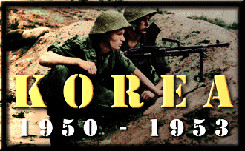Background to the Korean War
The Background to the Korean conflict stretches back to the division of the korean peninsular at the end of World War Two, with the Communist Russians taking possession of the industrial north, north of the 38th Parallel, and the United States ( under the auspices of the United Nations ) taking control of the agricultural south. Setting the stage for the conflict that would begin only five years later.
In 1949, both Russia and the United States withdrew their troops in 1949, leaving behind them the respective armies of the North, a powerful North Korean Soviet-trained army, and in the south, a smaller, weaker Republic Of Korea (ROK) army.
Stalin, interested in the expansion of Soviet Communism, saw vast opportunities in asia and the pacific, with the advent of the first Soviet nuclear test in 1949, he saw that he could soon challenge the United States. But rebuffed the North Korean leaders attempts to create a military alliance with Russia.
Another mistake, this time on the part of the Americans was the speech by the then Secretary of State Dean Acheson that implied that the Korean Peninsular was not within the defense perimeter of the United States. This speech, given at the National Press Club in January 1950, led the Communist leaders to believe that American support for the Government of South Korea would be limited.
This echoed throughout the communist world, and probably contributed a great deal to Stalin's reason for giving his support to a North Korean attack on South Korea. With Communism spreading across the pacific, the British and French both fighting to retain control of their colonies in the area. The French in Vietnam and the British in Malaya.
Stalin gave his approval to the North Korean attack dependent on the Chinese approval. Although the North Korea leader gave Stalin the impression that the war would be over in 30 days.
Using no radio or electronic signals as communications, as the Russian and North Koreans relied on human couriers, as fear of betrayal was high, to carry the attack orders to their division waiting near the front in deserted villages. Which the US Intelligence believed was an agricultural experiment, the North meanwhile used propaganda to call for Unifying elections and peace proposals.
Meanwhile, General McArthur, in Tokyo overseeing the rebuilding of Japan, discounted the reports that North Korean might attack. He was busy outlining his points for the upcoming Japanese peace treaty. North Korea on the other hand, failed to notify China of its intent and China was preparing to invade Taiwan at the time. CIA Intelligence reports of an impending attack went unheeded.



